History of Newcastle Rowing Club
Part 4 -The Modern Era, 1992 - (continued)
Part 4 pages: 1, 2, 3, 4, 5, 6
Competition
Early 1990's
NRC's first foray into the local regatta circuit was at the CDRA Championships at Taree in March 1993. The club's sole representative there (indeed throughout that first season) was Ian Kerr who competed in three events . Fittingly, Ian was the first member in the modern era to win a race (novice men's single scull at the Hunter regatta in late 1993). A list of successful rowers in championship events at local, state and national level regattas is contained in Appendix D. Annual award winners are contained in Appendix E.
Two regattas later the club confounded its rivals by winning twelve of the thirteen events held by the Upper Hunter RC on Lake Glenbawn; an incredible achievement by any standard.
NRC's inaugural regatta, sponsored by the NIB Health Fund, was held at Stockton on Sunday 6 February 1994 over a 800 metres course from the Boatrower's Hotel to the Port Hunter Sailing Club. In earlier times it was known as the 'Lower Stockton' course. The celebrity guest was Richard Powell, five times Australian Sculling Champion, Commonwealth Games silver medallist and Olympic finalist. Attempts to locate and invite as honoured guests anyone who had competed in our last regatta in 1895 were unsuccessful.
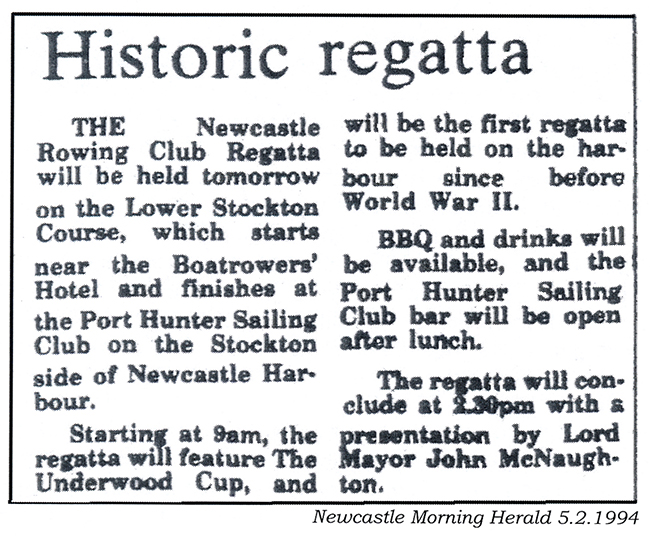
The feature race in a 34-event program was the "Underwood Cup", a single scull race open to invited rowers from CORA clubs and schools. This was a historic trophy last won by Frank Pearson in 1902 when it was competed for within the Port Hunter Rowing Club. The club's representative in the event (the 1994 one, not 1902) was Robert Gee. Robert has a distinguished rowing background having represented Great Britain at the 1987 world championships and was a bronze medallist for Great Britain in the under 23 lightweight coxless fours at the 1988 world championships.
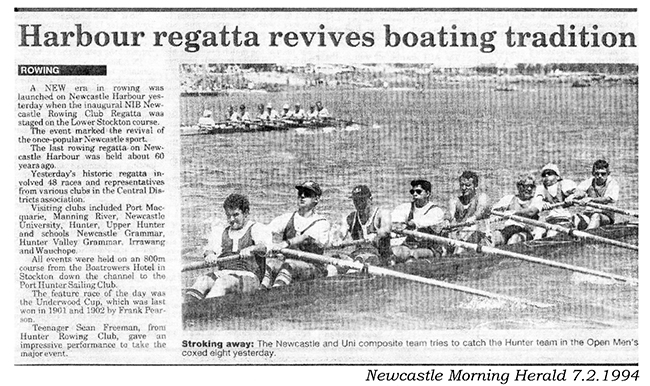
Successful competitors in this, our first regatta of the modern era, are worthy of mention. First place getters were Ian Kerr (novice men's single scull) and Robert Gee (men's masters single scull). Second place getters were Paul O'Callaghan (novice men's single scull); Ian Kerr & Simon Zablotsky (novice men's double sculls); Inga Berthold, L Hickling, Gwen Rolls, Kerri Hughes (cox Emily Stead) (senior women's coxed four); E Darke (junior men's single scull); Robert Gee, Ian Kerr, Matthew O'Callaghan, Drew Hickey, Steven Gaul, P Ferrais, John McLeod, James Mackay, (cox E Stead) (open men's coxed eight); Gwen Rolls, Glen Groves, Edward Sparke, P Nowland (cox Stuart McLeod) (mixed coxed four) and John McLeod, Steven Gaul, Ian Kerr, Peter Boyce, (cox S McLeod) (men's masters coxed four). Third place getters were Glen Groves, James Mackay, John McLeod, P Ferrais (cox E Stead) (intermediate men's coxed four) and Alisha Smith, Rebecca Stead, Kerri Hughes, Gwen Rolls (cox E Stead) (intermediate women's coxed four).
Rough water during the regatta due to wind combined with frequent shipping movements confirmed 150 years of experience that the Stockton course could not be relied upon to provide suitable conditions for racing. As if to emphasise the message and despite increasingly urgent warnings from the announcer, bow waves from passing tugs caused an eight to break in half. Consequently, for the next five seasons, apart from 1996 when bad weather forced a lastminute change of venue to Fennel ls Bay, club regattas were held at Kooragang on the South Arm of the Hunter River opposite the former BHP steelworks. There the river permitted a seven lane course 1000 m long.
Two of NRC's juniors at our inaugural regatta in 1994 went on to row internationally. Sons of club member Paul O'Callaghan, Matthew and his brother Tim trained with and competed for the club during school (and later, University) holidays. Matt (# 21) joined the club in 1993 as a 17 year-old junior. Tim coxed in 1994 before commencing rowing in 1995. Both boys rowed and became Captain of Boats with their school, St Joseph's College in Sydney.
Joining Sydney RC in 1995, Matt was a member of the winning NSW Youth eight in 1995 and 1996 and won the Trans-Tasman single scull in 1996. The following year he was a member of the Australian quad scull at the Nations Cup (foreruner of the World U23 Championships) in Milan. In 1998 he represented Australia in the U23 single scull at the Nations Cup in Greece and was a member of the Australian Senior A quad at the World Championships in Cologne. He rowed in a double scull at the 1999 World Championships in Canada. A personal highlight of his career with Sydney RC was a win in the quad race at the famous Henley Regatta in 2001.
Tim joined Sydney University Boat Club in 1999. He competed in the U23 coxless four at the Nations Cup in Hamburg (1999) coming second and for the following two seasons was stroke of the Australian Under 23 coxless four which competed in Denmark, Austria and Italy as well as at the East Asian Games and University challenge held in Taiwan. From 2000-2004 and in 2006, Tim was a member of the NSW Penrith Cup crew at the Kings Cup Regattas. In 2001 he took up an AIS scholarship. In 2003 he won the lightweight pair, lightweight coxless four and lightweight quad at the Australian Championships in Tasmania and finished second in the lightweight pair at the national selection regatta (LM2-) and gained selection as stroke in the Australian lightweight coxless four LM4- to qualify the boat for the Olympics . .
Tim was a member of the winning lightweight pair at the 2004 national selection regatta as a result of which he was selected to compete at the World Championships in Barcelona. At a lead up regatta in Amsterdam he won two Gold medals. In the 2006 Australian Championships he was second in the lightweight pair, and a member of the winning crew in the lightweight coxless four. This gained him selection in the Australian lightweight pair which finished second at the World Cup Regatta in Munich. He then stroked the lightweight coxless four that won silver at World Cup Regatta in Poland and was a finalist at the World Championships in Eton. Many current members including those who never even knew Matt or Tim attribute their success to the club's influence early in their rowing careers.
Whilst on the subject of successful former junior members, Damien Boyd ( #36) and John Harrington ( #37) represented their school, St Ignatius, at the 1994 Australian Championships achieving a second in the championship under 17 coxed four.
Highlights for the new club in the 1993-94 season were the Upper Hunter RC regatta where the club won twelve of the 13 events conducted and a particularly successful regatta at the State Masters Championships at Taree. There, the club finished eleventh out of the twenty-three clubs that attended. Seventeen members competed (only one the previous year) with one first placing, seven seconds and two thirds. The energy exhibited by club members at a dinner dance following the championships gave rise to suggestions that results should have been even better since they had obviously kept plenty in reserve. The season was remarkable in that both membership growth and competitiveness exceeded anyone's expectations.
Readers may think the name of an early competitor1 Jackie Kelly, sounds familiar. You'd be right. Some might associate Jackie with her involvement with a 'reality' television program in 2006 called Torvi/1 & Dean's Dancing on Ice. Apart from the possibility of nation-wide humiliation it sounds harmless enough notwithstanding the serious injuries several of the celebrities suffered in the first few weeks of the program. The idea was that a number of celebrities were each paired with a professional ice dancer to compete for whatever it is people dance on ice for. In a process of elimination, one couple is dropped from the contest each week by a mysterious combination of voting by judges and the public (via text messaging).
Unfortunately Jackie was eliminated quite early. Apparently she rowed better than she could skate. Others might recognise her as a Federal MP (1996 - 2007) with appointments including Federal Minister of Sport and Tourism and Parliamentary Secretary to the Prime Minister, John Howard. Jackie's background as a rower began while studying at Queensland University (the alma mater of our longserving treasurer Peter Boyce). She went on to represent Australia at Under 23 level in 1986.
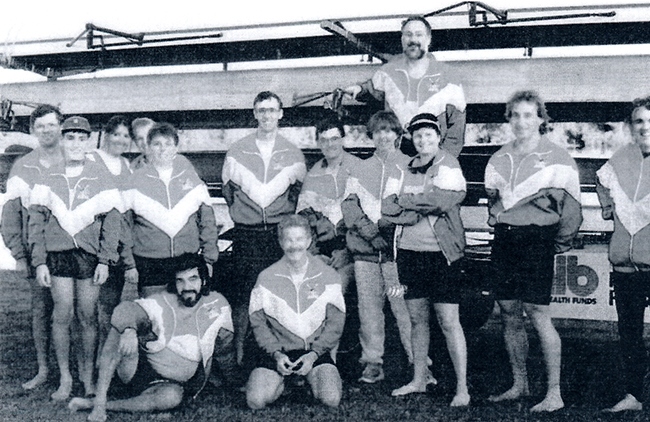
1993-94 State Masters Championships
At rear - Warwick Giles. Standing, L - R: John McLeod, Stuary McLeod, Jackie Kelly, unidentified (obscured), Leanne Burns, Paul O'Callaghan, James Mackay Kerri Lewins, Val Kost, Simon Zablotsky, Angela Brady. Front: - Jim Bardakos (sitting), Ian Kerr (kneeling).
Prior to the 1994-95 season action was taken to lift general club performance. To improve boat maintenance, members were assigned to one of four groups with each taking a turn at a monthly working bee. Two newish, second-hand boats - one four and a lightweight single - were bought in Sydney to upgrade the boat fleet which was regarded as inadequate for racing as evidenced by the necessity of borrowing boats from Irrawang High School and NUBC for regattas.
To raise the standard of rowing and cater for the club's rapid expansion, three squads were established. An "A" squad was for serious competitors intending to train four or more sessions per week as well as undertake off- water training such as the gym. "B" squad was for competitors with less commitment or having less time available to train. "C" squad was for non-competitive social and recreational rowers. In addition, a three-day rowing camp was held in July 1994 to cater for juniors from the area.
The club entered its first Sydney regatta at the Nepean Rowing Club at Penrith in late 1994. Results were modest but encouraging. On the other hand, results at the World Masters Games held at Brisbane in October 1994 were outstanding. Out of a total of seven gold, nine silver and seven bronze medals won by CDRA clubs, NRC were responsible for four, three and two respectively.
All of NRC's nine representatives who competed in the 1995 NSW Masters Championships held at Telegraph Point (Port Macquarie) came home with at least one medal. Results included three firsts, six seconds and three third placings.
The Australian Masters Championship regatta held on the Nepean River at Penrith in July 1995 is still remembered by competitors who had to contend with atrocious weather conditions. Members really earned their two firsts, one second, three fourths, a fifth and three sixth placings. Their glory was matched by the enjoyment of those who remained in Newcastle to distribute telephone directories.
High points of the 1994/95 season were second place in the CORA points score thereby exceeding all previous results; achieving either a win or place in 24 of the 27 events entered out of a total 46 at the Hunter Valley Grammer School regatta held at the Walka Water Works at Maitland; improved club facilities and an excellent financial position in that the club was debt-free.
In 1995, the club became involved in an unusual situation. The very strong University of NSW Boating Club, having won state premierships in 1993 and 1994, decided against re-affiliating with the NSW Rowing Association due to a dispute over fees for the 1995-96 season. UNSWBC canvassed other NSW clubs seeking one prepared to cater for its members. NRC's expression of interest was accepted. The university club not only leased its state-of-the-art fleet to Newcastle but also advised its members to join Newcastle. Fifty-four did so thereby more than doubling NRC's senior membership. Due to the influx of these rowers and availability of better boats NRC's competitive results during the subsequent 1995-96 season were exceptional as shown below:
- CDRA point score - equal winners with Manning River RC. Previously, the club was placed sixth in its first year of competition, fourth in the second year (1994/95). NRC was undefeated in both men's and women's eights events.
- CDRA four oared point score.
- CDRA Championships - seven first placings, thirteen second placings and two thirds. Eleven of these were championship events.
- NSW Championships - three first placings, two seconds and two thirds.
- State Sprints - one first place, two seconds and one third. Australian Championships - one third and one fifth.
- CHS Championships - a second.
- Pacific Age Championships - two seconds
- NSW Masters Championships - two firsts and a third
- Australian Masters Championships - two firsts, a second and three thirds
These performances placed the club eighth out of fifty clubs in the NSW Premiership.
As might be expected, regatta organisation proved to be extremely complex due to the necessity of combining competitors and coordinating the use of boats between the two separate groups. Assistance provided to NUBC in transporting its boats to regattas was an additional complication. The relationship with UNSWBC ended the following season when it re-affiliated with the NSWRA.
Prior to the 1995 AGM there was an age-old appeal for members to avoid damage to boats. There was also a familiar call for more people in or associated with the club to become Boat Race Officials. As the club's sole BRO Jim Bardakos was obliged to spend regattas in that role which meant that he was unavailable to either organise competitors or free to compete himself. Later Todd Fuller as club captain and sole BRO experienced the same difficulty. Todd was followed as the club's BRO by Colin Charters who, conscious of the age-old principle of separation of powers, ended a short though mediocre rowing career to fulfil that role.
Competition -Late 1990's
NRC successfully hosted the 1997 NSW Masters Championship, an enormous undertaking for such a new club. It was held under trying conditions on the south channel of the Hunter River at Kooragang. Results achieved were three seconds and two thirds.
At the Northern Rivers RA versus CORA Challenge regatta held at Armidale in February 1998, NRC was the second placed club. Best performances were by Jennifer Bissett, Phoebe Sanders and Shane Trotter.
During these first few seasons regular competitors who achieved consistent results included Jackie Kelly, Jacqui Marshall, Val Kost, Angela Brady and Jennifer Bissett. These ladies were followed by another strong group including Margaret Vercoe, Jan Hill, Jocelyn Ringland, Marian Henderson, Susan Doyle, Kris Gardner and Julie Palmer. Of the men during the early period, John McLeod has been our most successful and consistent performer for many years and Ian Kerr has an enviable record at local and masters events. Both had competed in our inaugural regatta in 1994. Matt Smith and Todd Fuller achieved many outstanding results in the late 1990s -early 2000. During that time, Robert Chaseling was the best performed of our juniors.
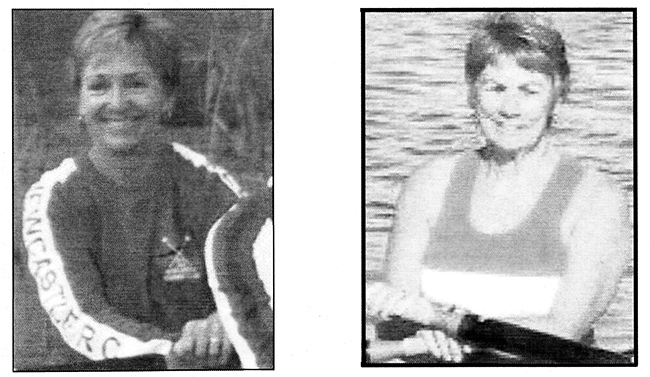
Long serving members, competitors and recipients of the Rowlock Award for exceptional service: Jocelyn Ringland (left, Vice President 1999-01, 2002-04, 2007-08 and Secretary 2001- 02 & 2004-05) with Margaret Vercoe, (right, A/Secretary 1999- 03 and A/Regatta Secretary 2004-07
Mini regattas were introduced early in 1999. They were held periodically on a Sunday morning either opposite the boat shed at Throsby Wharf or on Throsby Creek. The latter offers two formats -either a straight 400 metre course or across the creek and back. Going across the creek involves hundred and eighty degree turns that are amusing for the spectators and a test of skill for the participants. Crews are selected at random for a series of match races, i.e., between two boats.
Racing is followed by breakfast at the boat shed. Essentially a fun event, mini regattas serve as a useful transition for new rowers between training and their first regatta. They also provide an opportunity for both experienced and inexperienced rowers to row together and mix socially in an informal atmosphere. Their value was further demonstrated when a mini regatta in August 2001 included a trial of the relay concept that was to be applied in the LinwoodThrosby Gift, a relay concept that was introduced at our 2002 regatta.
Also in 1999, the committee adopted a bold though necessary initiative to hold future regattas on Throsby Creek instead of the Hunter River at Kooragang. Although the river was longer and wider than the creek, it was remote from shops and other facilities and the area generally was bleak and unappealing. A decisive factor was that Kooragang, being out of the public eye, made the task of attracting race sponsorship very difficult.
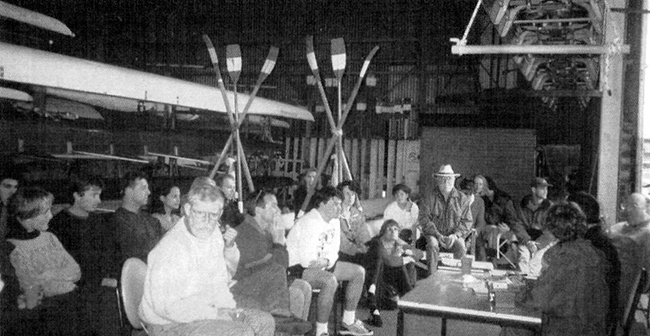
1999 AGM held in the boatshed. The stacked oars in the background were used in the ceremonial naming of two new doubles -the JB and the Throsby.
Although Throsby Creek only allows a 400 metre course of three lanes, it offers several important advantages. Being adjacent to the site of the proposed club shed is an obvious attraction. Furthermore, its location in the centre of a thriving residential area means our regattas are highly visible. This tends to make it easier (though still not easy) to attract race sponsorship. Shorter, sprint racing also proved to be popular with many rowers as well as making it easier for spectators to view the entire race. Success of the change to Throsby Creek was confirmed at our 2008 regatta which was the largest and most successful held by the club with 143 events held at three minute intervals.
Initially, regattas were based on the western bank. Residential development there and the planned new boatshed on the opposite shore resulted in subsequent regattas being transferred to the eastern side in 2003.
Several quiet years followed the heady successes (albeit under fortunate circumstances) enjoyed during the 1995/96 season. This was turned around by an enthusiastic core of rowers commencing with the 2000 NSW Masters Championships at which forty-two rowers or crews made finals.
That our strongest results at a regatta for some time were in masters events reflected the changing makeup of our membership which was becoming predominately female (upwards of 60%) a high proportion of whom were masters rowers. This evolution occurred naturally with the club neither advertising nor seeking to recruit from specific groups.
The encouraging lift in performances at the 2000 NSW Masters Championships carried over into the following season. Good overall results were achieved at the CDRA Championships (the highlight of which was a win in the championship men's coxless pair), NSW Championships (three members were part of the champion masters women's eight), NSWCHS championships (second in the champion women's coxed four) and pleasing results at the NSW and Australian Master's Championships and the Australian Masters Games.

Regattas on Throsby Creek, western bank. (1999-02)
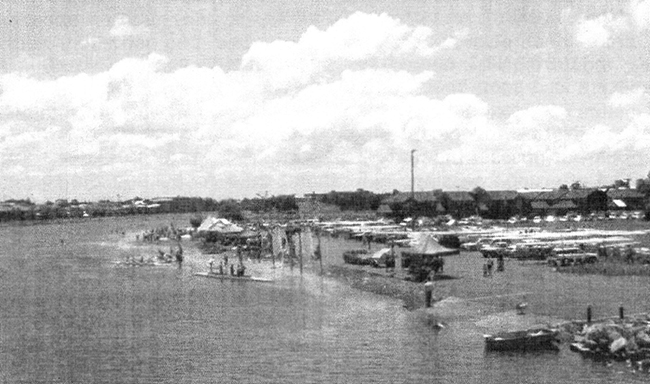
Regattas on the eastern bank, from 2003 BB (before boatshed)
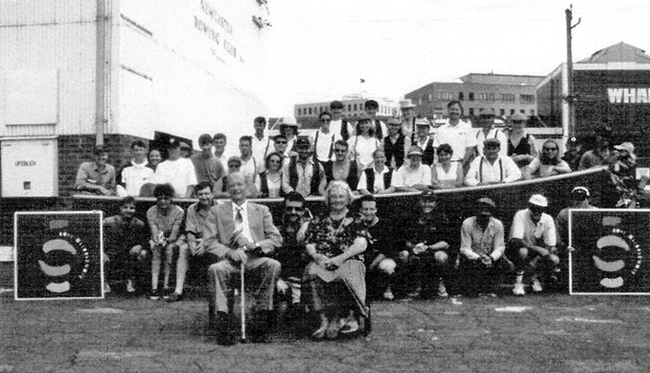
Participants (many wearing period dress -note the braces, etc.) in the Butcher Boat races that were part of Newcastle's Bicentennial celebrations in1997. Mr & Mrs Jim Latham (seated) were official guests. The Latham family were prominent during the early history of rowing in Newcastle.
From time-to-time organisers wishing to celebrate some occasion that has an aquatic connection like to include rowing races to add class to what might otherwise be a drab affair. Examples are the 1995 Australia Day celebrations when a few races were held on the harbour near Stockton: Newcastle Bicentennial celebrations in 1997 when NRC joined with several other CORA clubs to re-enact historic "butcher boat" races on the harbour and the Morpeth Bridge Centenary celebrations in 1998 when several clubs took part in some short races (350m) on the Hunter River.
Late in 1996, NRC agreed to conduct races of a totally different variety -in dragon boats, one of the water events to be held as part of the Newcastle Maritime Festival the following January. Responsibilities involved training inexperienced crews drawn from various businesses, industries, sporting clubs and the general public on two afternoon sessions beforehand then conducting the races on the big day. These were held over about 250 metres between the Customs House and Queens Wharf, once the the scene of Newcastle's Annual Regattas.
In the first few years, training and steering (using a sweep oar) were undertaken by club members James McDonald, Stuart McLeod, Tony Chaplin and Jennifer Bissett. Later, Lynn Flanagan and Colin Charters took over. Fortunately, no one had had any previous involvement with what are effectively large canoes so didn't know any better. Loading the twenty paddlers for training was safe enough as it was carried out in the Pilot Station Boat Harbour. On the other hand training was scary. Not only did the paddlers and coaches lack any previous experience in these craft but the eastern, i.e. ocean end of the harbour is subject to large swells and exposed to strong winds. Anyway, no-one was lost; as least as far as anyone knows since no one kept score. These days it is noticeable that dragon boats rarely venture so close to the heads - and now they use better boats with experienced crews and accredited coaches and sweeps.
The 1997 races were uneventful but no so in 1998. In that year, NRC's crew won the event and the somewhat unusual trophy for a rowing club. Being rowers, all those involved thought the result was inevitable. The event was memorable for the survivors because of the need to shelter between the pylons under the Queen's Wharf during a fierce electrical storm accompanied by torrential rain. The club conducted the event for the next two years, coming second in 1999 and unplaced in 2000. Neither of the last two experienced the drama of 1998. Quite rightly, our involvement with this form of aquatic sport didn't last. Facing forward whilst using paddles never felt right.
Competition - Early 21st Century
June 2001 saw the first of what was to become an annual event, a 44 km marathon row from Carrington to the NUBC rowing sheds at Berry Park. It is held under the auspices of the NUBC with NRC assisting with overall organisation, responsibility for boat marshalling, starting and various control functions along the course. NRC's men's quad of Todd Fuller, Matt Smith, Tony Chaplin and David Masters took the trophy for line honours in the inaugural event.
Commencing in Throsby Creek, the course wends its way through Newcastle harbour (one of the busiest coal ports in the world), past former industrial and waterfront land, harbourside land some of which has been redeveloped for prestige residential apartments, past busy coal loaders, then many miles - sorry kilometres - to the finish line along the Hunter River that can be tranquil or wild depending on wind and tide. From about half way, rowers are more likely to be ruing whatever foolish impulse got them there than admiring picturesque mangrove forests and farmland as they pass by.
In the period between 2001 and 2003, Anna Gray, Richelle Hughes, Kellie Peters and Renee Brighton were virtually unbeatable in the district in fours whilst our schoolgirls Merrin Starr, Emma Brennan, Louise Timbs, Kara Upton, Rachael Wischer, Alicia Jensen, Emma Brennan, Merrin Starr achieved many excellent results up to and including state level championships.
During that period Merrin Starr, Kara Upton, Gillian Holmes and . Emma Brennan with Gemma Savio as cox achieved a rare feat - a 5- hour row in a four around Kooragang Island. The challenging undertaking was an enormous surprise to local fishermen as the crew negotiated their way past several submerged barriers in what could have been mistaken for navigable channels. The girls' skill and enthusiasm was rewarded during the 2001-02 season with fine results at the CORA Championships, NSW Championships and NSWCHS Championships. Otherwise the club's best results came in either masters races or masters regattas, particularly in the Australian Masters Games.
At the club's annual Regatta on Throsby Creek in February 2002, a new event was introduced to the NRC regatta program: the "Linwood -Throsby Gift". It is a knockout sprint relay for competition between club teams each consisting of a mixed double, mixed four and mixed quad. Only one team per club may compete. The innovation has proved to be popular with participants as it involves more people in a single event and tests club depth. Prize money of $500 goes to the winning club. NRC won the event the first year then again in 2007. Other clubs having the temerity to take out our signature event can record the feat in their own history. The relay concept continues to generate interest both for competitors and spectators. Best of all perhaps, it usually attracts TV coverage.
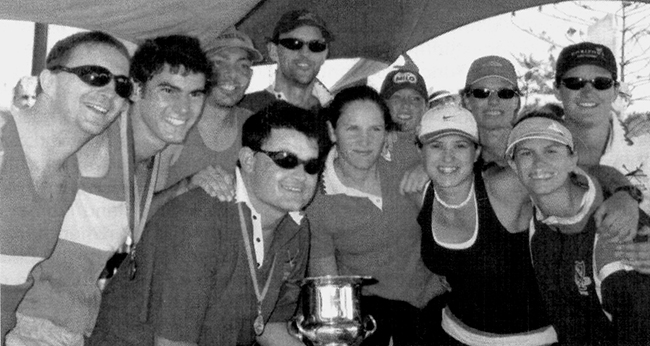
The winning team of the inaugural Linwood Gift (2002).
NRC's Robert Gee, Hugh McLeod, Paul Fray, Todd Fuller, Matt Smith, Merrin Starr, Rachael Wischer, Renee Brighton, Emma Brennan, Kelly Peters.

NSW Masters Championships, 2000. SIRC
Standing. L - R. Colin Charters, unidentified, Louise Ayliffe, Billie Bonevski, Bruce Webster, Lynn Flanagan, Jo Hatrigan, Graham Poole, Shane Trotter, Kate Harrington, Gert Salamon, Kris Gardner, Todd Fuller, Glen Crompton, Lotte Hansen, John McLeod, Steve Garz, Rachael Wischer, Allison Boyes, Jan Hill. Kneeling/sitting. Paul Murray, Sue Doyle, Phoebe Sanders, Anna Ocysek, Matt Smith, Julie Ann Palmer, Marian Henderson, Ian Kerr, Tony Chaplin, Linda Murdoch, Simon Zablotsky, Margaret Vercoe, Jacqui Harvey.
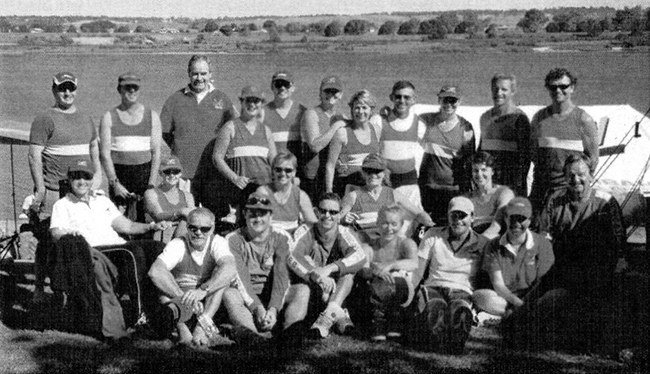
NSW Masters Championships, 2002. Grafton
Back row, 1-r. Dave Masters, Tony Chaplin, Adrian Holmes, Kate Harrington, John Harrington, Kris Gardner, Margaret Vercoe, John McLeod, Jan Hill, Kevin Rowston, Colin Dixon. Centre row. Sue Doyle, Julie-Ann Palmer, JoeRingland, Jacqui Harvey, Colin Charters. Front row. Ian Kerr, Todd Fuller, Matt Smith, Marian Henderson, Kelly Peters, Renae Brighton.During the next few seasons membership numbers remained high -typically averaging around 120 members each year - and rowing activity was consistently strong. Although participation in competition was disappointing, there were some notable achievements.
One was the growing reputation of Hugh McLeod at CORA, State and National Championships. Hugh started rowing in 1993 following his father, John (who is NRC President) and his brother Stuart into the sport. Coached by his father, a win in the single sculls at the 2003 NSWCHS Championship followed by a very credible second in the B Final of the School Boy single sculls at the Australian Championships gave impetus to a blossoming career.
He went on to dominate CORA Single Sculls Championships winning on a record four successive years, 2003-06. Over the same period he was also part of several championship doubles and quad crews.
In 2004 he came fourth in the Mens Elite Lightweight single sculls at the NSW Championships. He won the Men's Lightweight single sculls at the Pacific and Age Medals Regatta and joined another rower to win the Men's Lightweight double sculls. After an arduous process Hugh was selected in the NSW team to contest the Australian/NZ Youth Cup. This was an under 21 competition between teams (each of ten men and ten women) from the Australian states as well as one from the ACT and one each from the north and south islands of New Zealand. Hugh gained second places in the Men's Lightweight single sculls and Men's Mixed Lightweight double sculls.
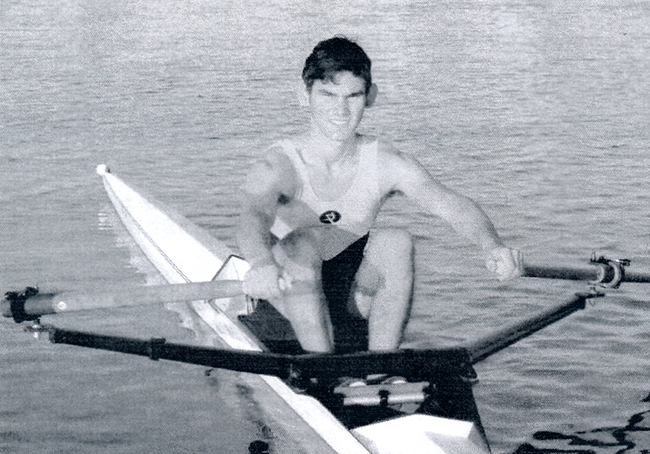
Hugh McLeod
In 2005 he earned an excellent second in the Men's Elite Lightweight single sculls at the NSW Championships followed by a fifth in the final of the U23 Men's Lightweight single sculls at the Australian Championships. In the same year he came fourth with an Adelaide rower in the Men's Open Lightweight double sculls at the Australian Championships.
After the usual series of exhaustive trials, Hugh was selected as a member of the men's lightweight quad in the Australian U23 team. Training was carried out at the Australian Institute of Sport in Canberra prior to continued training with the full Australian squad leading up to the 2005 World Cup Regatta on the magnificent natural Rotsee course in Lucerne, Switzerland. The World Cup is an open aged regatta that involves current world and Olympic champions so was used by the age team as a trial leading into the U23 Championships. Nonetheless the crew rowed strongly in the highest company to get through the heats.
Fifty nations entered the World U23 Championships on the Bosbaan course in Amsterdam. Hugh's crew came fifth in the final, one of the best performed of the Australian crews.
The same year he was nominated for the NSW Institute of Sport Outstanding Achievement Award in recognition of his success whilst continuing to train and compete with his Newcastle club. It is widely acknowledged that achieving elite level in any sport is significantly more difficult away from the support and competition available to athletes in Sydney or other major cities.
Hugh was again selected in the lightweight quad crew as a member of the 27- person Australian team to compete in the 2006 World U23 Championships in Hazewinkel, Belgium. Following another lengthy selection process the team spent two months training in Tasmania (in the middle of winter would you believe) prior to departure for final preparations in northern Italy (much nicer but more distractions) prior to the event. Coming fifth at the 1500 metre mark behind Germany, USA, Russia and Italy and in front of France - a formidable list of rowing nations - the Australians came third for a Bronze medal. Since they were less than a quarter of a second behind second place (USA) and just 0.27 seconds behind the winner Germany, it would be reasonable to call it a close finish.
In 2007 Hugh won a silver medal in the Mens Elite Lightweight single sculls at the State Championships and another silver in the U23 lightweight single sculls at the Australian Championships. Subsequently, he was selected in the NSW Penrith Cup crew for the Interstate Men's Lightweight coxless four. This was the first time a state representative was selected direct from the CORA. His continued good form resulted in selection for the third successive year in the 2007 World U23 Rowing Championships in at Strathclyde in Scotland where the crew came fourth. He was also selected in the 2008 Olympic shadow squad.
Hugh relocated to Sydney at the start of the 2007-08 season to pursue better employment opportunities. Transferring to Sydney Rowing Club gave him the opportunity to train and compete at a higher level than is possible in Newcastle. As a member of SRC he won silver in the Mens Open Lightweight quad sculls and bronze in the Mens Open Lightweight double sculls at the 2008 Australian Championships. The following year he won silver in the Mens Open Lightweight coxless pair at the State Championships followed by two bronze medals at the Australian Championships, one in the Mens Open Lightweight single sculls and the other in the Mens Open Lightweight coxed eight.
Two enthusiastic masters competitors, Robyn Cragg and Yvonne Collings, arrived at the club in late 2003 bringing a high level of commitment to training and competition. Since then, either in singles, together in doubles or pairs or crewed with fellow members Lyn Tolmie and Ann Campbell in fours and quads the women have contributed significantly to the club's competitive results. They set a fine example to others by entering as many races in as many regattas as possible so that in the 2005/06 season Robyn had competed in at least seventy-one events (excluding heats): a club record. One of their best performances was at the 2005 Australian Masters Championship with Robyn and Yvonne winning the coxless pairs in E category plus second in the E double sculls. In addition either individually or in crews with others the ladies had two second and three third placings in non-championship events.
Robyn's impressive record culminated in 2006 when she was awarded Newcastle City Council's prize for outstanding Sporting Achievement (Female Masters).
Our youngsters have also achieved success with Nick Wilkinson and Ben Farnsworth half of a CDRA representative crew that won the men's under 17 quad scull event at the 2004 NSW Championships. Not for the first time, an opposing crew from Sydney, obviously unimpressed by their country opponents, commented before the event that the CORA crew "had come a long way to be beaten". Laura Dunn was another who did well in CDRA and NSWCHS championship events. Laura then went on to bigger and better things when, as a member of the UTSRC she won gold as a member of the Women's Open Lightweight quad sculls at the 2008 Australian Championships followed by another gold in the Women's U23 Lightweight quad sculls at the 2009 Australian Championships. She also represented NSW as a member of the Lightweight Women's quad sculls at the Interstate Kings Cup in 2009.
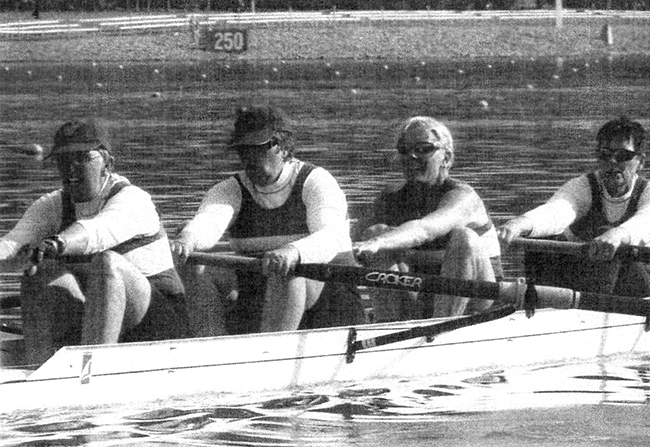
Robyn Cragg (s) Lynn Tolmey (3) Ann Campbell (2) and Yvonne Collings (b) at the 2007 Australian Masters Rowing Championships
2006-07 was a successful season due to increased regatta participation and good results at regional, state and national regattas. (Regaining the Linwood Throsby Gift relay was especially pleasing. Retaining the prizemoney was never considered (honest)). Hugh McLeod's selection in the NSW Penrith Cup crew (LW4-) and national selection for the third year in a row for the world U23 Rowing Championships was a significant achievement.
As will be explained later, competition was severly hampered throughout the 2007-08 and 2008-09 seasons by the necessity of operating from a trailer. With only a few boats were available on just three mornings each week, training was, to put it mildly, quite limited. Even so, in 2007-08, members attended 23 regattas and two of our rowers achieved state representation; Robyn Cragg in the CVWD 4x and Georgia Lowe, who joined the club from Newcastle Grammar School's rowing team, in the NSW Women's Youth 8+ at the Interstate Regatta.
Coaches and Coaching
At the risk of stating the bleeding obvious, coaching is crucial in the success and perhaps even the survival of a rowing club. Over the years, the NRC has been fortunate to have a group of coaches with the necessary ability, experience, willingness and availability to carry out this task.
Early coaches were Val Kost and Jacqui Marshall, Jim Bardakos, Michael Budden, Greg Murray and John McLeod. They were assisted by experienced rowers, Ian Kerr and Simon Zablotsky.
From the mid-1990s some of these left to be replaced by others such as Jennifer Bissett, Tony Chaplin, Todd Fuller, Shane Trotter and Colin Charters. Long serving members such as Jocelyn Ringland and Margaret Vercoe played important roles in organising and administering introductory courses. Robyn Cragg, Yvonne Collings and Lyn Tolmey joined the coaching group in 2003.
Late in 2003 Daniel Bishop (a former member of the Swan River Club, a WA and Australian representative and coach at London Rowing Club) arrived unexpectedly at the club offering to coach. Needless to say his offer was quickly accepted. Daniel was primarily responsible for coaching the club's junior squad. He also played a leading role in training courses conducted by the CDRA or under the auspices of the Newcastle Academy of Sport. In 2004 Daniel was accepted as an elite rowing coach with the NSW Institute of Sport under a scheme that decentralised rowing so that quality rowers did not necessarily have to relocate to Sydney to receive top level coaching. Hugh McLeod was a particular beneficiary of this scheme.
In the mid-late 1990s a large sign outside the boat shed on the Merewether Street Wharf facing Wharf Road invited members of the public to try rowing on any Sunday morning. Whilst the sign attracted many new rowers to the club, numbers fluctuated between none and twenty five so it was it impossible to anticipate the number of coaches necessary, if any, likely to be needed on any day. Nor was there any continuity. Many responding to the sign had their row then were never seen again.
Improvements to our introductory courses for prospective rowers have been made from time to time. In 2001 for instance, a format was adopted whereby interested people received one try-out row following which they could elect to undertake an introductory training course involving five, two-hour sessions held on successive Saturdays. Participants were introduced to single sculls and fours.
Further refinements were made to the system the following year. Prospective rowers now attend an information day when they find out about the club and rowing in general. Those who decide to continue then undertake six 1112 hour session over a six week period. This allows the club to run courses during periods when the regatta program permits and coaches can be organised with more certainty. Paying in advance means that attendees are more inclined to commit to the entire course thereby gaining a better understanding of what the sport had to offer before deciding whether or not to join the club. In addition, the course format tends to establish friendships within the group which eases their assimilation into the club. Training in singles is carried out on Throsby Creek with boats transported to the site by trailer or rowed there (500m) by coaches. Subject to safe water conditions, crew boats were launched from the club pontoon. Location of the new boatshed on the bank of the creek will greatly facilitate the training of new rowers.
Apart from club coaches, the keen or gifted rower can avail themselves of other coaching opportunities One example was a 3-day rowing camp hosted by the club in July1994 in conjunction with the Hunter Academy of Sport. Since then development programs have become an increasingly important part of NRC's and CDRA's rowing calendar. They involve three or four days of practical and theoretical training by top regional and NSW rowing coaches during the Christmas school holidays. The aim of such camps is to improve individual rowing skill, develop understanding of the theory and physical aspects of the sport, expose rowers to different coaches and have the students work closely with other rowers of similar standards from other clubs. Those conducted since 2001 have been held at Taree which is a central location for most clubs.
Part 4 pages: 1, 2, 3, 4, 5, 6
Previous < Twentieth Century Rowing in Newcastle
Next > Appendix A - Boats
